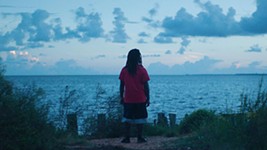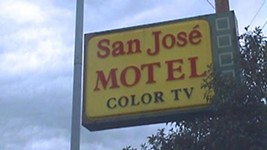The Reich's Right-Hand Man
AFS Documentary Tour: 'Harlan: In the Shadow of Jew Süss'
By Anne S. Lewis, Fri., March 19, 2010

Joseph Süss Oppenheimer was a well-known historical figure, a Jew in the court of 18th century Württemberg, about whom a sympathetic novel was written in 1925 and a British film (Jew Süss) was made in 1934. In 1940, Joseph Goebbels, newly tuned into the power of film as an instrument of hate propaganda, tapped the prominent German filmmaker Veit Harlan to "remake" the 1934 film, gilding it with a star-studded German cast and twisting the facts of the costumed period-piece melodrama into anti-Semitic Nazi propaganda. Harlan's Jew Süss was a huge hit, was required viewing for the SS, and was seen by 20 million people in the Third Reich, inciting anti-Jewish violence in places like France and Italy, as well. In fact, director Michelangelo Antonioni, then a young film critic, writing about the film at the Venice Film Festival, praised its cinematic refinement, dismissing any propagandist subtext.
After the war, Harlan was tried twice – and aquitted twice – for crimes against humanity for his film, the only Nazi-era filmmaker to be so charged. Harlan made more than 30 films during his lifetime and maintained, until his death in 1964, that he was forced by Goebbels to make the film, which is still banned in Germany.
Although German filmmaker Felix Moeller says his documentary, Harlan: In the Shadow of Jew Süss, is not another "children of the perpetrators" film, he takes a look at how Harlan's family – including the five children Harlan had with three wives (the first, Jewish); his niece, Christiane Kubrick (widow of Stanley Kubrick); and his grandchildren – deal with the stigma of Harlan's film legacy. (Interestingly, his 1945 epic, Kolberg, was the basis for Inglourious Basterds' pivotal film-within-a-film, Stolz der Nation.) His family's reactions range from critical to defensive to indifferent, the image of a dad who had many Jewish friends versus the one who created a murder weapon.
Austin Chronicle: How did you become interested in making this film?
Felix Moeller: While studying the films of the Third Reich, I discovered that Veit Harlan was more important for the Nazi Regime than the more famous Leni Riefenstahl.I wanted to establish him as the real No. 1 top Nazi film director. His films drew the largest audiences, often more than 20 million for each film, and his third wife, Kristina Söderbaum [who stars in Jew Süss], was one of the biggest female screen stars of the time.
AC: Were all family members cooperative?
FM: It took some time to convince all the family members to participate. There is tension in the family and it was like, "If he's in the film, I'm not going to take part." But, after we began the interviews, a positive, very forthcoming attitude developed and they also provided me with that wonderful home-movie footage and various photos. That the entire family is in the film is exceptional. Other documentary filmmakers have been unsuccessful in their efforts to interview the progeny of prominent Nazi artists.
AC: What do you hope viewers will take away from your film? Do you think your film resonates differently with a German audience than an American one?
FM: I hope this combination of history, film history, and family history will resonate with the audience, because I think this is a new approach. It was important to me not only to tell the historical facts but also to demonstrate this generational aspect and the different perceptions.
In Germany, people approached me after screeningsand told me about similar experiences in their families, with a patriarch's Nazi past and the difficulty for his progeny to come to terms with it or confront him and talk about it. Much was swept under the carpet.
In America, Harlan was largely unknown, even for those who knew of the film, the idea was to show who the man was behind this perfidious film. The subject of "German guilt" and how today's younger generation deals with it was also a subject American audiences wanted to talk about after the screenings.
AC: Some reviewers have suggested that you, as the director, signaled your position on Harlan's responsibility/culpability by including the scene from Jew Süss in which Süss defends himself by saying, in essence, he was "just following orders." Is that accurate?
FM: No, I found it ironic that Harlan included this scene in the film and then later found himself in court, defending himself with the same arguments he'd written for the Oppenheimercharacter he was denouncing. Harlan was a career-driven, over-ambitious opportunist who, in my opinion, could have refused to make Jew Süss – even at the price of his career.
AC: What was so unique about Harlan as a filmmaker?How did he compare with Leni Riefenstahl in terms of style and stature?
FM: Riefenstahl was the star director of the Thirties, with her pioneering documentary aesthetics. She was a woman, and it was assumed that she'd had a love affair with Hitler. That made her unique and fascinating.
Harlan was the top filmmaker of the Forties, a skillful master of sentimental melodrama, blood and soil, kitsch and human emotions. His filmic late-Romanticism was deeply rooted in German culture and soul. While Riefenstahl had direct access to Hitler, Harlan worked in close cooperation with Propaganda Minister Goebbels.
AC: A little-noticed bit of information wasAntonioni's ecstatically positive review of Jew Süss at the 1940 Venice Film Festival – was this shocking? And was the film really as "cheesy" and similar to a Passion play as the clips in your film suggest it was?If so, why do you suppose it generated such a following?
FM: I don't think Antonioni was an anti-Semite – he fell for the strong power of the film's imagery, the best German actors of the time, an effective script, and subtextual sexual messages. That shows us how different perceptions were back then. Things that today seem cheesy and banal, kitschy or outdated and overdone, carried people away in the propagandistic context of 1940.
AFS Documentary Tour in conjunction with the Austin Jewish Film Festival presents Harlan: In the Shadow of Jew Süss on Wednesday, March 24, 7pm, at the Alamo Drafthouse at the Ritz. Robert H. Abzug, director of UT's Schusterman Center for Jewish Studies, will introduce the film. Tickets are $4 for AFS members and $6 for the general public. For more info, see www.austinfilm.org.










